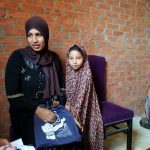Hosam Ibrahim - IFPRI, Egypt
On August 28th, 2018 the International Food Policy Research Institute (IFPRI), in collaboration with the American University in Cairo (AUC), launched the 2018 Global Food Policy Report. The event was attended by a number of high-level government officials including the Ministry of Investment and International Cooperation, the Ministry of Planning, Monitoring and Administrative Reform, the Ministry of Agriculture and Land Raclamation as well as members of the academic community in Egypt.





